Norfolk State University: Building on a Powerful Social Work Education Tradition
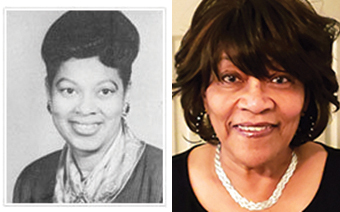
Norfolk State University’s social work education has come a long way since hard-charging social work practitioner Dr. Ethelyn R. Strong (pictured left) launched a BSW program there in 1960.
Through Strong’s efforts, Norfolk State eventually became one of just five HBCUs in the country to offer a social work PhD, and the only HBCU in Virginia with both an MSW and a PhD, says Dr. E. Delores Dungee-Anderson (pictured right), interim dean of Ethelyn R. Strong School of Social Work.
When Dungee-Anderson took her current position in 2019, she maintained the school’s tradition of continuous improvement, pushing timely upgrades for the MSW and PhD.
PhD: New Takes on Research and Teaching
“I thought the PhD needed revamping,” says Dungee-Anderson. Working with the university’s graduate school and the provost, the social work school added five research electives, including a mixed-methods, qualitative-quantitative course, to help make the degree more rigorous, comprehensive and competitive. It also added some required teaching courses, she says, which is essential to producing social work scholars.
With many universities’ social work PhD degrees “there’s not a lot of preparation on how one goes about learning to teach,” says Dr. Viola Vaughan-Eden, the school’s PhD program director and associate professor. “So we decided to make it a deliberate component by requiring the teaching courses. We show how to develop curriculum, design syllabi, prepare tests, grade papers—all of those things.”
The Ethelyn R. Strong School’s PhD focuses on cultural diversity and specifically on African American families, says Vaughan-Eden. “Most of our students are African American and have done research specifically on the issues facing African American families.” For instance, one recent PhD graduate—Devonna King, a social worker with Amedisys Hospice in Burlington, N.C.—has done her dissertation on hospice care in the African American community.
“Many African Americans do not like to use hospice at the end of life and are more on the track toward curative care,” King says. “I wanted to go behind the scenes to try and understand why.” Reasons, she found, include lack of education about hospice, distrust of the medical system, wanting to continue aggressive treatment, and strong spirituality.
MSW: Adding Specializations
Another area ripe for revamping was the MSW, which had a basic clinical focus but could benefit from having specializations, says Dungee-Anderson. She pushed for four specializations the school already had been considering—military, child welfare, macro and school—and they launched in August 2021.
Military was a natural since Norfolk is home to the world’s largest naval base, says Dr. Breshell Jackson-Nevels, MSW program director and assistant professor. Courses include “Military Policy & Services,” “Social Work Practice with Military Families” and “Trauma and the Military.” Internships have involved sites like the Veterans Administration, various hospices and Norfolk’s Up Center, which helps vets who have PTSD.
And the macro specialization has had some valuable internships in the Virginia legislature, city governments and various community agencies. Says Jackson-Nevels, “We have MSW students that sat at the table with policy leaders and came to realize, ‘I didn’t know how much policy affects practice.’”
One Norfolk State MSW student, Bryant Jenkins, has been named NASW’s 2022 MSW Student of the Year for the state of Virginia.
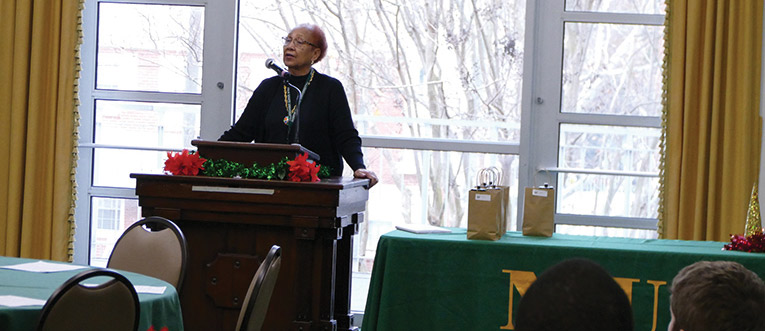
Professor Carrie Waites speaks at a grant-sponsored social work human trafficking series event in 2019
The Secret of Its Success
There’s a secret sauce behind the school’s field partnerships and many special initiatives, says Dr. Dianne Davis-Wagner, assistant professor. And that would be the social work advisory board, which is “primarily made up of community stakeholders from a wide variety of practice areas in social work who are a vital part of the school,” says Davis-Wagner, who is the board’s faculty liaison. “They assist us in identifying internship opportunities. they support us financially. they serve as guest speakers in classes.” Among the members are Dr. Wanda Bernard-Bailey, current board chair and the deputy city manager for the City of Chesapeake; Virginia Senate President Pro Tempore L. Louise Lucas; and Dr. Faye Felton, who is Ethelyn R. Strong’s daughter.
Still, the groundwork for the Norfolk State social work school’s ongoing success was laid decades ago by a single individual: Dr. Ethelyn R. Strong herself. “She was adamant about trying to get a school of social work and a graduate program [in the Hampton Roads area],” says Davis-Wagner. “She was knocking on doors in the legislature and was very feisty. She really had to take the bull by the horns to get the school going.”
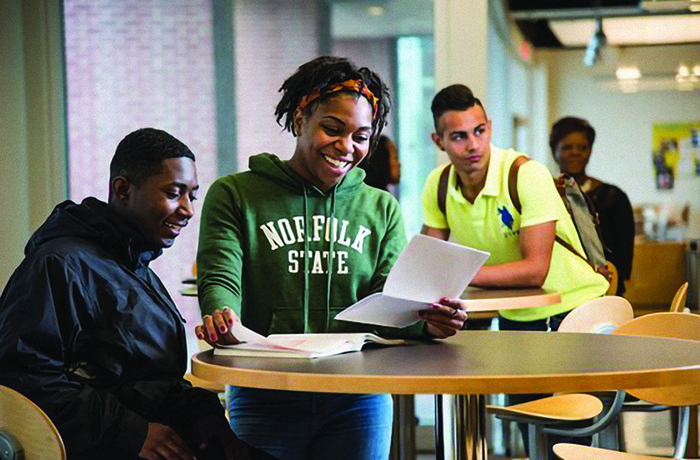
Norfolk State University is the only HBCU in Virginia with both an MSW and a PhD in social work.
Seattle University: Building Social Justice Into Clinical Practice
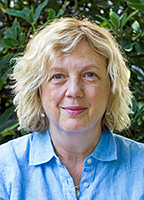
Dr. Mary Kay Brennan, DSW, LICSW, MSW program director and clinical professor, talks about her program’s focus on equity and social justice, and how it dovetails with the university’s Jesuit tradition.
How would you distinguish your MSW program from others in terms of focus?
While other programs may have different tracks—child/family, policy, administration—we are one track, and that’s clinical social work. that’s all we do, and we are specifically training folks for community-based behavioral mental health.
Where does the university’s Jesuit tradition figure in?
[In alignment with] Seattle University’s Jesuit commitment to social justice—basically, that education is for the formation of leadership toward a just and humane world—we really want to prepare our students to think critically, to analyze social inequity and oppression and how it’s manifested.
We have a major statement, a social justice statement, that talks about our equity lens, our anti-oppressive analysis and practice, critical pedagogy and decolonizing framework. [Department chair] Dr. Hye-Kyung Kang has led us through this articulation of what it means throughout our curriculum. It determines the authors we select, the speakers, the skill development, how we do assessment. it informs all of our content.
Could you give an example?
One of our anchor courses that is not required by accreditation is called “social work and social justice: ethical professional formation.” It anchors social justice as an essential element of their professional formation and looks at structural inequities and how they impact a person’s ability to succeed in the world. It teaches this anti-oppressive analysis, which leads to the view of intersectionality—the idea that there are many identities and contexts that we all bring, and that help [develop] our own identity.
University of St. Thomas DSW: Teaching How to Be Social Work Educators
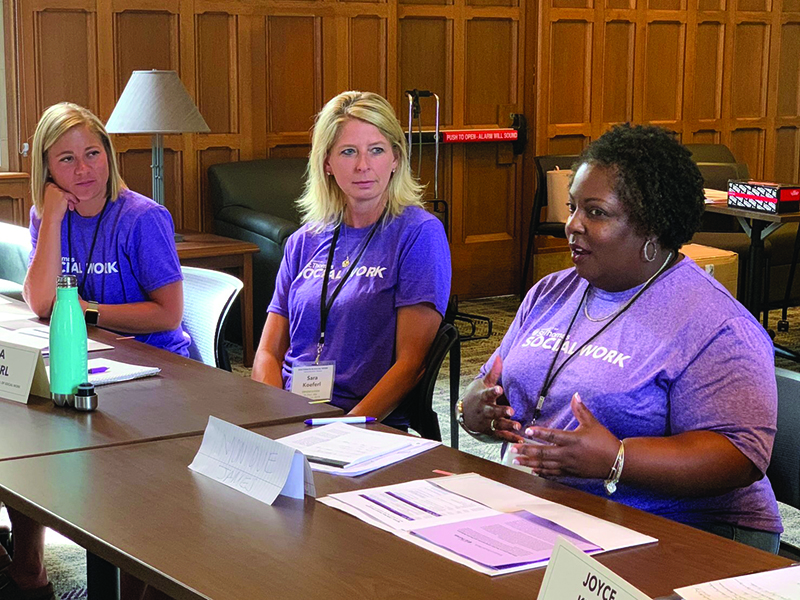
University of St. Thomas DSW students at their orientation on the St. Paul campus in July 2019.
As opposed to the research-intensive PhD, the DSW degree is more of a practice doctorate, often centered around developing advanced skills in clinical work or in managing agencies or other operations. then there’s the University of St. Thomas DSW.
The university’s Morrison Family College of Health School of social work debuted its DSW program in 2014 as the first one in the country to teach advanced skills in providing social work education, according to Dr. Catherine Marrs Fuchsel, DSW director and associate professor. The program’s typical student, Fuchsel says, “is the seasoned social work teacher who has been teaching for a long time in the academy [setting], whether they are adjuncting or are lecturers or even assistant professors. they’re instructors in the smaller schools looking to advance their careers.”
The three-year St. Thomas DSW program brings students onto campus in St. Paul, Minn., for two weeks in July, then switches to distance learning for eight weeks in the fall and spring in a combination of asynchronous online classes and synchronous video-conferencing classes. Students also complete a “banded dissertation,” comprising two publishable articles—one conceptual or theoretical and one research based—and then a choice of writing a third article, presenting at a peer-reviewed conference or developing a course.
Along with teaching advanced skills, any type of DSW program is valuable for another reason, says Fuchsel. “A lot of allied health professionals also have practice doctorates, like nursing, occupational therapy, physical therapy, so I think it helps in terms of being able to work with these other allied health professionals.”